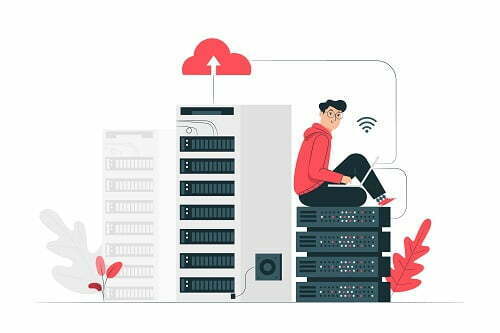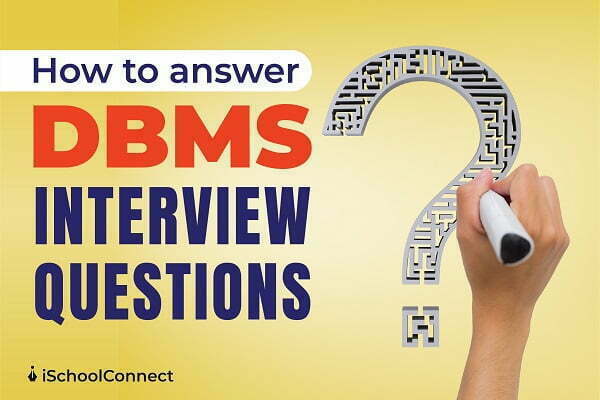Table of Contents
- Q2. What are the features of database languages?
- Q3. What are the various relationships of databases?
- Q4. What is SQL?
- Q5. What is Data Independence?
- Q6. What are the advantages of DBMS?
- Q7. What do you understand by the terms Entity, Entity Type, and Entity Set in DBMS?
- Q8. What are the different types of keys in the database?
- Q9. What are SQL keys?
- Q10. What are joins in SQL and what are the different types of joins?
- Tips
- FAQs
In today’s market, a huge amount of data gets generated every day. It is not possible to keep a track of it manually. This is why you need database management systems (DBMS) to organize and analyze data and generate accurate results. And in order to manage this data, you need data scientists, engineers, and managers.
If you’re looking for a job in this field as a graduate, you must be well prepared and confident enough to crack your interview. A database management system interview can be quite nerve-racking for students. Paying attention to details is crucial. Do this by learning about the kind of questions you may be asked during your interview and preparing your answers well in advance.
Here are the top questions related to DBMS asked in interviews-
Q1. Define a database and the different types of DBMS
A database is an organized collection of information, or data, typically stored in a computer system. It allows better management and easy access to the data.
There are different types of databases, such as-
- Hierarchical databases
- Network databases
- Object-oriented databases
- Relational databases
- NoSQL databases
Make sure you answer this question to the point and do not provide more information than necessary. This answer will help the interviewer understand your basic understanding of the subject.
Other commonly asked DBMS interview questions are-
Q2. What are the features of database languages?
Database languages are used to create and store data in the computer system. DBMS is one of the features of the database language, which is a software application for the management of data. Database languages also facilitate modification and alteration of query results by averaging, counting, summing, etc.

Q3. What are the various relationships of databases?
There are three relationships of databases-
- One-to-One relationship
- One-to-Many or Many-to-One relationship
- Many-to-Many relationship
Q4. What is SQL?
SQL is a domain-specific language used in programming and designed for managing data held in a relational database management system. It can also be for stream processing in a relational data stream management system.
Q5. What is Data Independence?
Data Independence is defined as a property of DBMS that helps you change the database schema at one level of a database system without requiring you to change the schema at the higher level.
Q6. What are the advantages of DBMS?

There are many advantages of DBMS, such as-
- Improved data sharing
- Improved data security
- Better data integration
- Minimized data inconsistency
- Improved data access
- Improved decision making
- Increased end-user productivity
You’ve almost finished going through all the DBMS interview questions! Read on!
Q7. What do you understand by the terms Entity, Entity Type, and Entity Set in DBMS?
Entity: An entity is a thing in a real-world with independent existence. It is distinguishable from other objects, and can be identified uniquely.
Entity Type: It refers to the category that a particular entity belongs to.
Lastly, Entity Set: An entity set is a collection or set of all entities of a particular entity type at any point in time. The type of all the entities should be the same.
Q8. What are the different types of keys in the database?
The different types of keys in the database are-
- Primary Key
- Candidate Key
- Alternate Key
- Super Key
- Composite Key
- Foreign Key
- Unique Key
Q9. What are SQL keys?
An SQL key is either a single column (or attribute) or a group of columns that can uniquely identify rows in a table. SQL keys ensure that there are no two rows with duplicate information. Not only that, but they also help in establishing a relationship between multiple tables in the database.
Q10. What are joins in SQL and what are the different types of joins?
(INNER) JOIN: Returns records that have matching values in both tables.
LEFT (OUTER) JOIN: Returns all records from the left table, and the matched records from the right table.
RIGHT (OUTER) JOIN: Returns all records from the right table, and the matched records from the left table.
Apart from these, you may also be asked generic questions during your interview. Here are a few tips to follow when appearing for a DBMS interview-

Tips
First and foremost, understand that the intention of every interviewer is to evaluate you beyond your application. They look for certain traits in you, and you must answer accordingly. Read on to find some useful tips below.
1. Research and read
Before you appear for your interview at any company, you must do thorough research about the company and make sure you know enough about them. Besides this, the interviewer will only want to have those candidates on board who clearly understand the topic.
2. Pay attention to your soft skills
Whenever you have to be present for an interview, make sure to mind your communication skills, listening skills, and body language. The interviewer will study you and you must put your best foot forward.
3. Have a positive attitude
There may be a question that you don’t know the answer to. In that case, do not guess the answer. There is no reason to be scared. You can take a moment to think or be blunt and say you don’t know. Stay positive about your approach.
4. Make a good first impression
It goes without saying that a good interview means you created a really good impression on the interviewers. You must be polite, greet interviewers, and never overdo anything. The best way to impress the interviewer is to remain calm and polite.
5. Analyze the topic
Try not to jump the gun into a conversation unless you are absolutely confident of what you want to say. Analyze the topic of the discussion properly, prepare points and arguments in your mind so that you can speak confidently when the time comes.
6. Feel free to ask questions
It is not true that only the interviewer can have questions. You may also ask questions about your job role, etc. which gives out an impression that you’re interested and proactive.
7. Use examples while answering
Remember that real-life experiences matter a lot. So when you are answering questions related to DBMS or any technology, always use relevant examples to support your answers.
FAQs
Q1. What are the key qualities required for DBMS?
Ans: Accuracy and good time-management skills are required for DBMS.
Q2. Will I be asked about my strengths and weaknesses in an interview?
Ans: Yes, an important part of an interview is understanding your strengths and weaknesses.
Q3. Can there be group discussions in interviews?
Ans: Yes. Group discussions help interviewers understand your skills and professionalism better. Moreover, they test your decision-making and problem-solving skills.
Q4. Can DBMS interviews be conducted online too?
Ans: Yes, in certain cases, these interviews may also be conducted online.
Q5. What can I expect from a data analyst interview?
Ans: Interviewers ask questions about data analysis to evaluate how you perform each step. You must also mention how you handle missing, duplicate data, structural errors, outliers, and others.
If you have any more doubts about DBMS interview questions, you can get in touch with us. Or you can also comment below and share your thoughts!






